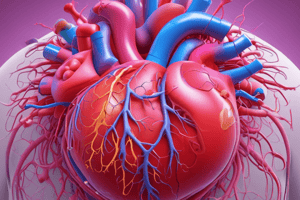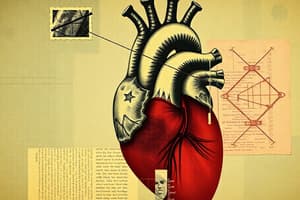Podcast
Questions and Answers
What are some factors that contribute to the variation in diastolic function among individuals?
What are some factors that contribute to the variation in diastolic function among individuals?
Genetic and environmental influences
What do treatments for heart failure aim to achieve?
What do treatments for heart failure aim to achieve?
Manage symptoms, improve quality of life, and prevent further deterioration
Why is there currently no cure for heart failure?
Why is there currently no cure for heart failure?
Because heart failure is managed rather than cured
What are the main components of heart failure treatment?
What are the main components of heart failure treatment?
What insights can be gained by exploring the complexities of heart function?
What insights can be gained by exploring the complexities of heart function?
What is heart failure?
What is heart failure?
Describe the difference between systolic and diastolic functions of the heart.
Describe the difference between systolic and diastolic functions of the heart.
What specific tests are used to diagnose heart failure?
What specific tests are used to diagnose heart failure?
How does diastolic dysfunction impact heart failure progression?
How does diastolic dysfunction impact heart failure progression?
Why is the left side of the heart struggling to fill with blood considered a sign of heart failure?
Why is the left side of the heart struggling to fill with blood considered a sign of heart failure?
Study Notes
Dissecting Heart Function
The human heart is a remarkable organ, powering life through continuous contractions and relaxations. Its complex physiology involves not just the beating itself, but also intricate connections between our hearts and overall health. Let's delve deeper into the workings of our hearts and some relevant aspects of heart function.
Heart Failure Overview
Heart failure occurs when the heart muscle cannot effectively pump sufficient amounts of blood to meet the body's demands. While its name implies a literal failure, heart failure actually refers to a gradual loss of heart muscle strength. Specifically, the heart's left side struggles to fill with blood for eventual circulation while the right side finds it harder to empty blood into veins after receiving it.
Diagnosing heart failure requires consideration of medical history and physical examination, along with specific tests like electrocardiography (ECG), chest X-rays, and blood tests measuring levels of B-type natriuretic peptides (BNPs).
Diastolic vs. Systolic Functions
While systolic function pertains to heart contraction, responsible for pushing blood forward through either ventricle, diastolic function focuses on the heart's ability to fill with incoming blood before each contraction. Both functions interplay within the broader context of cardiovascular health. For instance, diastolic dysfunction impacts heart failure progression as well as the aging process.
Genetic and environmental influences contribute to the variation seen in diastolic function among individuals. Studies show that diastolic function is a heritable trait affected by genes involved in myofilament mechanics, protein synthesis under mechanical stress, and regulation of cardiac contractility.
Therapy Options and Management
There is currently no cure for heart failure, so treatments aim to manage symptoms, improve quality of life, and prevent further deterioration. These treatments vary depending on the cause, stage, and existing conditions of the person. They typically involve lifestyle changes, medication regimens, and possibly surgical intervention for advanced cases.
In summary, heart function spans beyond mere pumping activity, encompassing intricate mechanisms that ensure efficient exchange of fluids throughout our bodies. By exploring these nuances, we gain insight into the heart's significance and complexity as part of our collective physical wellbeing.
Studying That Suits You
Use AI to generate personalized quizzes and flashcards to suit your learning preferences.
Description
Explore the physiology of the human heart, including the mechanisms of heart failure, diastolic versus systolic functions, and available therapy options. Learn about the diagnosis of heart failure and the importance of managing symptoms for improved quality of life.




